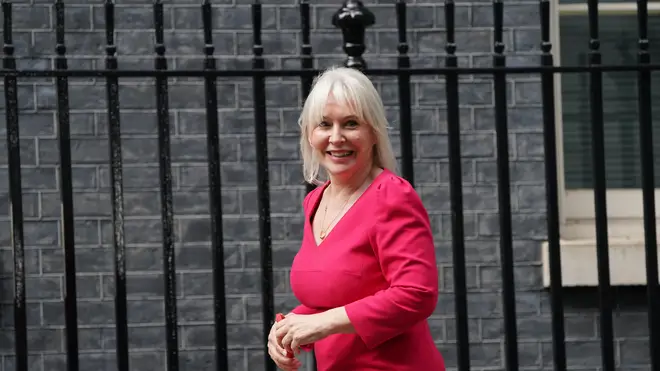
Ian Payne 4am - 7am
5 February 2022, 15:34

Nadine Dorries said bosses could ‘absolutely’ end up behind bars.
Mark Zuckerberg could end up in jail if Facebook does not comply with new online safety laws, the Culture Secretary has warned.
Nadine Dorries warned that she was putting social media giants such as Facebook on notice with her Online Safety Bill, which it is hoped will force online giants to act on illegal content.
On Friday, it was announced the long-awaited Bill had been strengthened with the addition of a number of new criminal offences to force social media firms to act on illegal content more quickly.
Offences such as revenge porn, hate crime, fraud, the sale of illegal drugs or weapons, the promotion or facilitation of suicide, people smuggling and sexual exploitation have been added to the list of priority offences and as such must be removed by platforms under the new rules.

Under the new rules, senior executives of online platforms could end up in prison if they do not act, Ms Dorries has said.
Speaking to Times Radio, the Culture Secretary was asked whether Meta boss Mark Zuckerberg could end up behind bars if his firm, which owns Facebook, did not comply.
She said she hoped the Bill would be a “notice to the online platforms to say here it is, we’re letting you know what it is now, so start doing what you need to do”.
Asked again if senior executives could find themselves in prison if they did not comply, she said: “Absolutely.”
But Andy Burrows, head of child safety online policy at the NSPCC, said this was not the case.
He said: “Despite the rhetoric, the Government’s current proposals mean tech bosses wouldn’t be personally liable for the harmful effects of their algorithms or failing to prevent grooming, and could only be prosecuted for failing to supply information to the regulator.
“It’s clear that unless the Online Safety Bill is strengthened sufficiently, criminal sanctions offer bark but no bite. Children need well-designed regulation that learns lessons from other sectors if the Bill is to match the rhetoric and prevent inherently avoidable abuse.”
Ms Dorries also rejected the idea of age verification online as young people use the internet to buy clothes.
Asked why the measure was not being considered, and she told BBC Radio 4’s Today programme: “We’re looking at age verification, but what I would say about age verification is there is a downside to that too.
“That means that any children accessing the internet need to verify their age and all young people.
“And young people go onto the internet to go shopping, you know, on clothes.
“Do we need to ensure that they verify their age when they’re doing that?”
The beefed-up Bill means that while sites would have previously been forced to take down such content after it was reported to them by users, they now would be required to be proactive and work to prevent users from encountering such content in the first place.
The Government said that naming these offences on the face of the Bill also enables the proposed regulator Ofcom to take faster enforcement action against firms that fail to remove it.
The changes come after three separate reports from parliamentary committees warned the draft Bill required strengthening and more clarity for tech firms on what was expected of them if it was to offer adequate protection.

“This Government said it would legislate to make the UK the safest place in the world to be online while enshrining free speech, and that’s exactly what we are going to do,” Ms Dorries said.
“Our world-leading Bill will protect children from online abuse and harms, protecting the most vulnerable from accessing harmful content, and ensuring there is no safe space for terrorists to hide online.”
Three new criminal offences, recommended by the Law Commission, are also to be added to the Bill in an effort to make criminal law fit for the internet age, the Government said.
The new offences cover communications that are sent to convey a threat of serious harm; those sent to cause harm without a reasonable excuse; and those sent which are known to be false with the intention to cause non-trivial emotional, psychological or physical harm.
Damian Collins, chairman of the Joint Committee on the Draft Online Bill which led the scrutiny of the Bill, said he welcomed the changes and that they would benefit users.
Meanwhile, Labour has called for the Bill to be strengthened further through tougher sanctions for senior executives at firms who breach the new online safety laws.

Lucy Powell, Labour’s shadow culture secretary, said: “Security and safety online should be a top priority for the Government, but the Tories have spent years dragging their feet, allowing dangerous and illegal content proliferating online to go unchecked.
“The Online Safety Bill is too weak to make big tech firms sit up and take notice, and ensure that hate, crime and child abuse are stamped out in the online world.
“The regulator Ofcom will be taking on some of the biggest tech firms in the world.
“It’s a David and Goliath situation, and Ofcom must have access to the full range of tools in its belt, including making top bosses criminally liable for persistently failing to tackle online harms.”